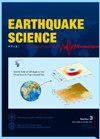地震数值预报模式的评价
IF 1.2
4区 地球科学
Q3 Earth and Planetary Sciences
引用次数: 0
摘要
评价地震数值预报模型需要考虑两个同等重要的问题:模拟的应用场景和模型的复杂性。基于评价的模型选择准则面临着一些值得探讨的有趣问题。本文章由计算机程序翻译,如有差异,请以英文原文为准。
Evaluation of numerical earthquake forecasting models
Evaluation of numerical earthquake forecasting models needs to consider two issues of equal importance: the application scenario of the simulation, and the complexity of the model. Criterion of the evaluation-based model selection faces some interesting problems in need of discussion.
求助全文
通过发布文献求助,成功后即可免费获取论文全文。
去求助
来源期刊

Earthquake Science
GEOCHEMISTRY & GEOPHYSICS-
CiteScore
1.10
自引率
8.30%
发文量
42
审稿时长
3 months
期刊介绍:
Earthquake Science (EQS) aims to publish high-quality, original, peer-reviewed articles on earthquake-related research subjects. It is an English international journal sponsored by the Seismological Society of China and the Institute of Geophysics, China Earthquake Administration.
The topics include, but not limited to, the following
● Seismic sources of all kinds.
● Earth structure at all scales.
● Seismotectonics.
● New methods and theoretical seismology.
● Strong ground motion.
● Seismic phenomena of all kinds.
● Seismic hazards, earthquake forecasting and prediction.
● Seismic instrumentation.
● Significant recent or past seismic events.
● Documentation of recent seismic events or important observations.
● Descriptions of field deployments, new methods, and available software tools.
The types of manuscripts include the following. There is no length requirement, except for the Short Notes.
【Articles】 Original contributions that have not been published elsewhere.
【Short Notes】 Short papers of recent events or topics that warrant rapid peer reviews and publications. Limited to 4 publication pages.
【Rapid Communications】 Significant contributions that warrant rapid peer reviews and publications.
【Review Articles】Review articles are by invitation only. Please contact the editorial office and editors for possible proposals.
【Toolboxes】 Descriptions of novel numerical methods and associated computer codes.
【Data Products】 Documentation of datasets of various kinds that are interested to the community and available for open access (field data, processed data, synthetic data, or models).
【Opinions】Views on important topics and future directions in earthquake science.
【Comments and Replies】Commentaries on a recently published EQS paper is welcome. The authors of the paper commented will be invited to reply. Both the Comment and the Reply are subject to peer review.
 求助内容:
求助内容: 应助结果提醒方式:
应助结果提醒方式:


